MASLD Pharmacotherapy With Patrick Horne
Chat with MASLD AI

Hi, I am MASLD AI.
Suggested Questions :

MASLD AI 03:40 AM

Join Patrick Horne, NP for a clear, clinic-ready overview of MASLD/MASH pharmacology—from the lifestyle backbone to cardiometabolic risk reduction and liver-directed therapies. Patrick breaks down where GLP-1 receptor agonists fit, reviews evidence and patient selection for vitamin E and pioglitazone, and spotlights resmetirom—the first FDA-approved THR-β agonist for non-cirrhotic MASH with F2–F3 fibrosis—including mechanism, key MAESTRO-NASH outcomes, common AEs (nausea/diarrhea), and practical drug–drug interactions. Walk away with a step-by-step approach to selecting therapy, setting measurable lifestyle goals, and using NITs to monitor response and guide duration—so you can confidently tailor treatment and improve outcomes.
Related Podcast
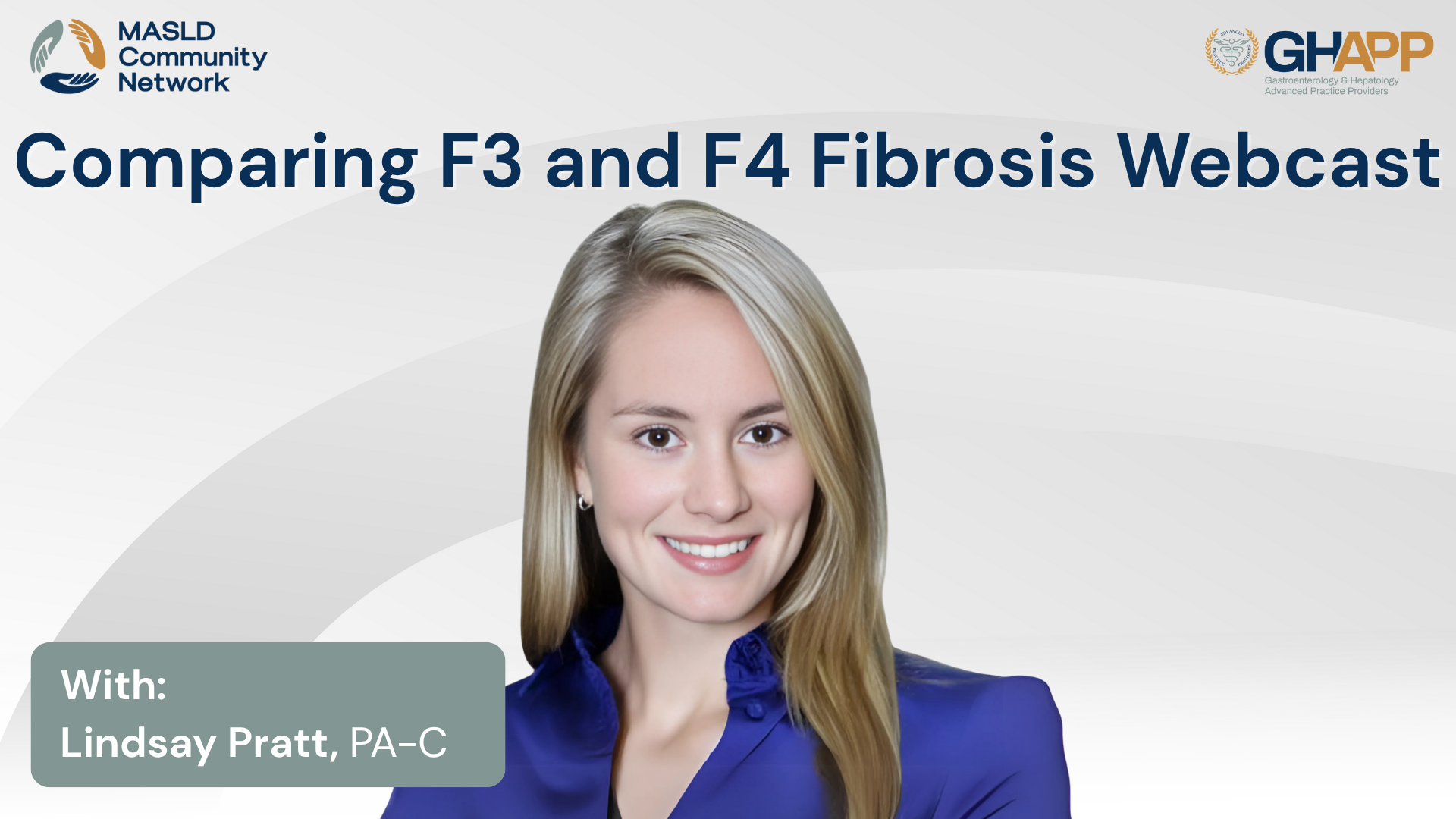
Comparing F3 and F4 Fibrosis With Lindsay Pratt

Join Lindsey Pratt, PA-C from the University of Colorado Liver Transplant Program, for an in-depth clinical comparison of F3 and F4 fibrosis in patients with MASLD (Metabolic Dysfunction–Associated Steatotic Liver Disease) and MASH (Metabolic Dysfunction–Associated Steatohepatitis). Using an identical patient profile with differing non-invasive testing results, Lindsey demonstrates how to accurately stage fibrosis using tools like FIB-4, FibroScan, CAP score, and ELF test—emphasizing when pharmacologic intervention is appropriate and when advanced monitoring becomes critical. This session explores the clinical implications of fibrosis staging, treatment pathways including resmetirom (Rezdiffra), the role of GLP-1 receptor agonists, and practical nutrition and lifestyle strategies. For F4 patients, Lindsey outlines key elements of surveillance for hepatocellular carcinoma (HCC), portal hypertension management, and transplant evaluation. Whether you're in hepatology or primary care, this case-based discussion offers evidence-backed guidance for managing patients across the MASLD/MASH spectrum and preventing liver disease progression.
Watch Now

MASLD Basics With Valerie Shin

Join Valerie Shin, NP, from the Pfleger Liver Institute at UCLA, for a foundational discussion in the GHAPP MASLD Community Network, sponsored by Madrigal Pharmaceuticals. This educational session covers the basics of steatotic liver disease (SLD), with a special focus on the evolving terminology and diagnostic criteria surrounding MASLD (Metabolic Dysfunction-Associated Steatotic Liver Disease) and MASH (Metabolic Steatohepatitis). Valerie explains why the shift away from the outdated “fatty liver” label is more than semantics—it removes stigma, increases diagnostic precision, and improves patient-provider communication. Through clear visuals and case-based discussion, this presentation outlines the global epidemiology of MASLD, how to classify disease etiology (MASLD, MetALD, ALD, or other rare causes), and how to risk-stratify patients using non-invasive tools like FIB-4, FibroScan, and ELF. Learn how to diagnose MASLD, when to refer to hepatology, how to use biomarkers for staging fibrosis, and when pharmacotherapy like resmetirom may be appropriate. With rising global prevalence and many patients progressing silently to cirrhosis or HCC, early detection and management are key. Don’t miss this practical, clinically grounded presentation designed for APPs and primary care providers managing patients with metabolic liver disease.
Watch Now
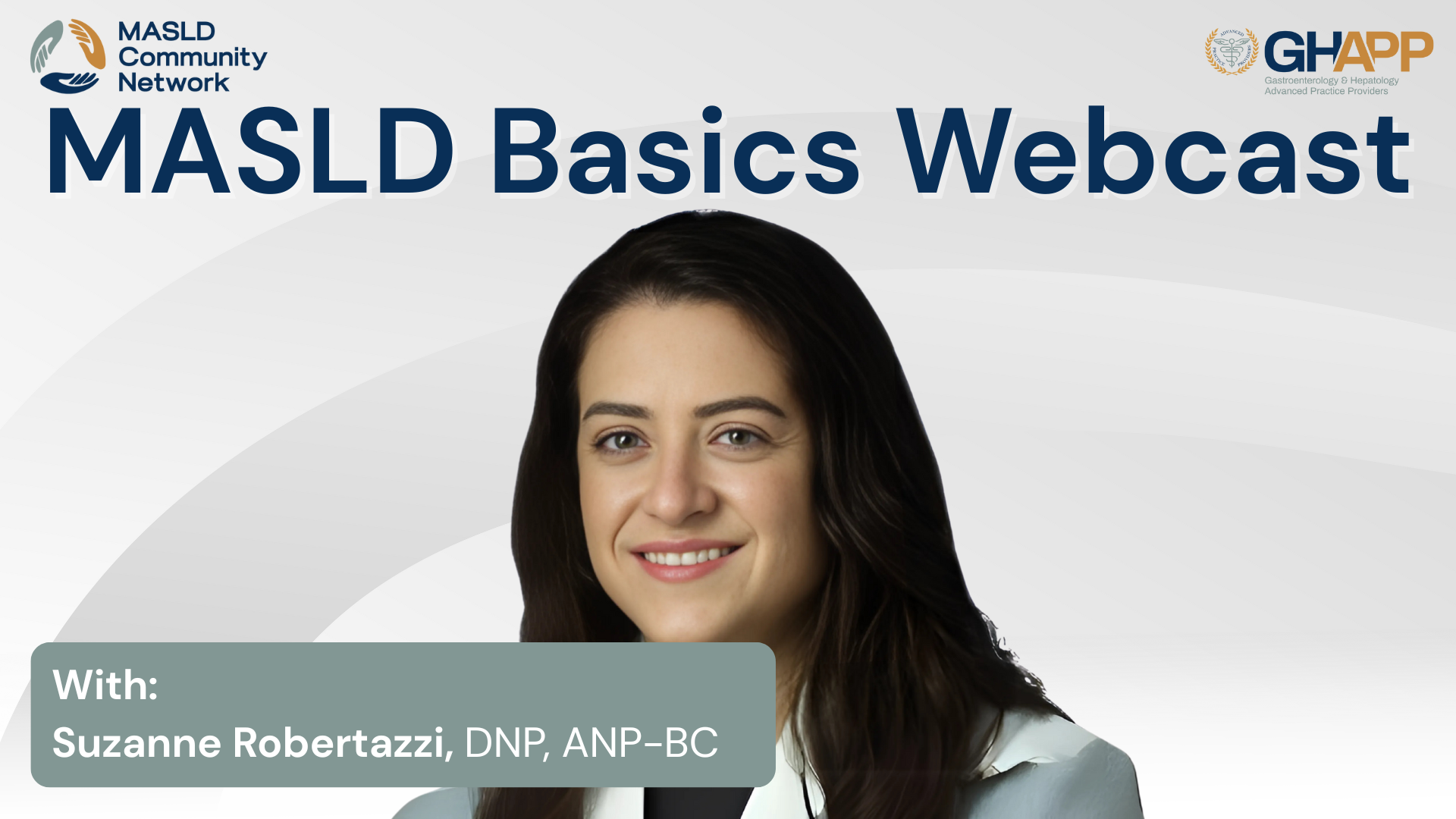
MASLD Basics With Suzanne Robertazzi

Join Suzanne, a nurse practitioner from the Washington DC VA Medical Center, as she kicks off a comprehensive lecture series on steatotic liver disease, focusing on the evolving understanding of MASLD (Metabolic dysfunction-associated steatotic liver disease) and MASH (Metabolic dysfunction-associated steatohepatitis). In this foundational session, Suzanne walks through the new nomenclature replacing NAFLD and NASH, and outlines the clinical criteria used to identify and stratify patients along the MASLD–MASH spectrum. Learn how metabolic risk factors such as obesity, prediabetes, hypertension, and dyslipidemia contribute to disease progression, and explore the use of non-invasive diagnostic tools like Fib-4, FibroScan, and ELF scores to assess fibrosis. The session also discusses indications for liver biopsy, the implications of overlapping etiologies (like alcohol-associated liver disease), and strategies for identifying patients at high risk for cirrhosis, hepatocellular carcinoma (HCC), and liver-related mortality. This lecture equips clinicians, particularly those in primary care and hepatology, with a practical framework to evaluate steatosis, interpret metabolic profiles, and determine when to refer patients for specialty care. Whether you're new to liver disease or looking for updates on MASLD and MASH terminology, this session is an essential starting point.
Watch Now
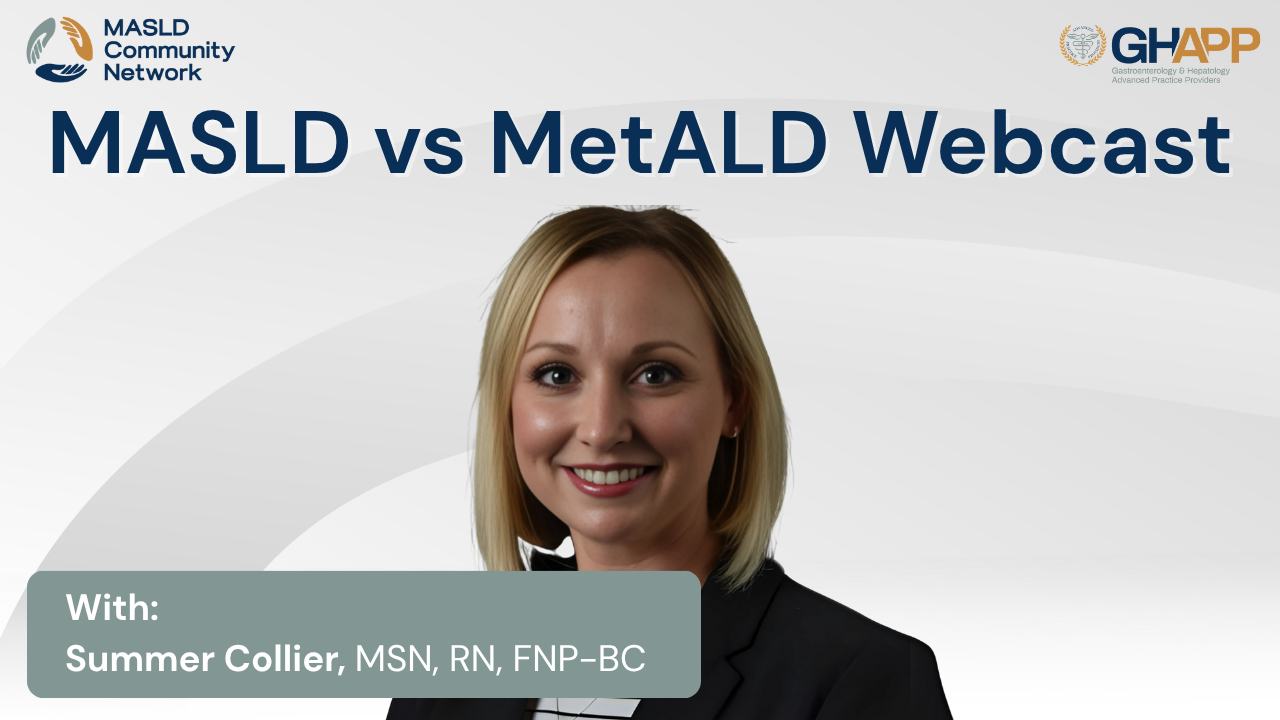
MASLD vs MetALD With Summer Collier

In this educational session from the GHAPP MASLD Community Network, Summer Collier, NP at UC San Diego Health, explores the overlap between metabolic dysfunction–associated steatotic liver disease (MASLD) and metabolic dysfunction plus alcohol-associated liver disease (MetALD) through a detailed clinical case study. Using real-world patient data, she highlights key considerations for evaluating, diagnosing, and managing steatotic liver disease, with special focus on teasing out the dual drivers of metabolic risk factors and alcohol consumption. Viewers will learn about diagnostic tools such as FibroScan, CAP scores, and PEth testing, and how these objective biomarkers help distinguish true MASLD from alcohol-driven disease. The discussion also covers pathophysiology, risk of fibrosis progression, patient counseling on lifestyle and alcohol cessation, current treatment recommendations, and hepatocellular carcinoma (HCC) screening in advanced fibrosis. Whether you are a hepatology provider, APP, or clinician interested in MASLD and MetALD, this session provides practical insights into patient education, disease classification, and the importance of standardized definitions for clinical care and research.
Watch Now

PCP Screening for MASH/MASLD: Identifying At-Risk Patients

In this essential FAQ video, Jennifer Geremia, PA-C, a seasoned gastroenterology provider practicing in Boston, outlines current primary care screening guidelines for identifying patients at risk for metabolic dysfunction-associated steatohepatitis (MASH) and MASLD. With nearly two decades of experience caring for GI and liver patients, Jennifer emphasizes the importance of integrating liver health into routine health maintenance—particularly for individuals with type 2 diabetes, obesity, metabolic syndrome, and related conditions. She reviews practical steps for risk stratification, beginning with FIB-4 scoring using readily available labs, and discusses how to interpret and act on the results, including when to refer for further testing like elastography or ELF testing. Viewers will also gain insight into patient counseling strategies, alcohol intake guidance, and the urgency of acting early—even in asymptomatic patients. This video is a must-watch for primary care clinicians aiming to improve detection and management of MASH and MASLD through evidence-based screening and timely intervention.
Watch Now
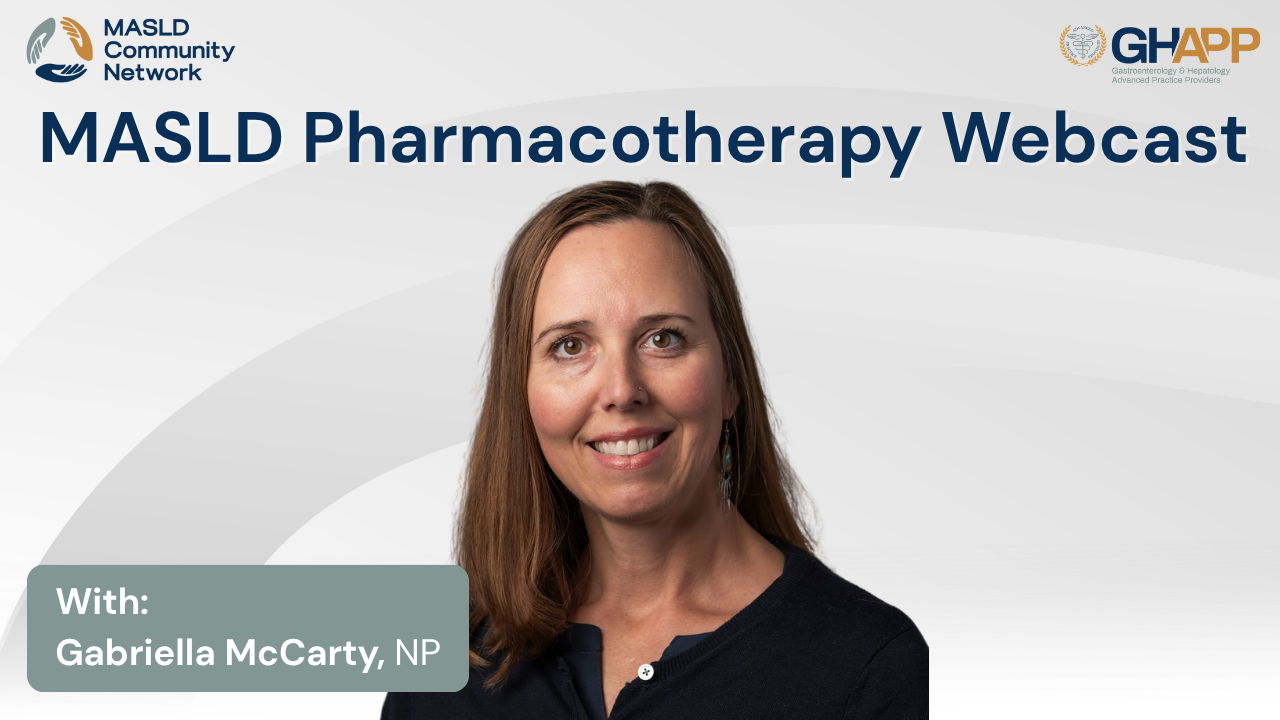
MASLD Pharmacotherapy With Gabriella McCarty

In this presentation, Gabriella McCarty, NP at North Shore Gastroenterology, explores the evolving management of Metabolic Dysfunction–Associated Steatotic Liver Disease (MASLD) and MASH with a focus on pharmacotherapy. Drawing from her 26 years in gastroenterology, IBD, and hepatology, she explains how fatty liver disease is often detected incidentally and highlights the importance of early diagnosis and patient education. Gabriella reviews the three-pillar approach to treatment—lifestyle and weight loss strategies, cardiovascular risk reduction, and emerging liver-directed therapies. She discusses the role of GLP-1 receptor agonists, Vitamin E, Pioglitazone, and the first FDA-approved therapy, Resmetirom, detailing their mechanisms, benefits, and safety considerations. With insights from the MAESTRO-NASH trial and real-world experience using non-invasive tests like FibroScan, CAP scores, and ELF testing, this session provides practical guidance for clinicians managing MASLD/MASH and preventing disease progression to cirrhosis or hepatocellular carcinoma.
Watch Now

Podcast: LFTs Demystified: A Practical Guide for APPs

In this podcast episode, Michelle Barnett, PA-C, a liver disease specialist based in Colorado Springs, provides a clear and practical overview on demystifying liver enzyme abnormalities—particularly in the context of MASH (Metabolic Dysfunction–Associated Steatohepatitis) and MASLD (Metabolic Dysfunction–Associated Steatotic Liver Disease). With MASLD affecting nearly 1 in 4 American adults, understanding liver enzyme patterns is critical for early detection and effective management. Michelle breaks down commonly reported values from hepatic function panels—ALT, ALP (alkaline phosphatase), and total bilirubin—explaining what constitutes normal, acute, subacute, and chronic elevations. She walks through hepatocellular, cholestatic, mixed, and isolated hyperbilirubinemia patterns and what they reveal about underlying liver conditions such as MASH, alcohol-associated liver disease, viral hepatitis, biliary obstruction, and drug-induced liver injury. Whether you're a provider or a patient looking to better understand lab results, this episode delivers expert guidance on interpreting liver enzyme elevations to support more informed clinical decisions.
Watch Now

Beyond Basic NITs: When is Liver Biopsy or Advanced Imaging

In this episode, Brian Lam, PA, Associate Director of Research at Inova’s Liver and Obesity Research Program in Northern Virginia, explores the nuanced decision-making involved in going beyond basic non-invasive tests (NITs) for diagnosing and managing MASH (metabolic dysfunction-associated steatohepatitis). While FIB-4 and transient elastography are useful initial tools, Brian breaks down when and why clinicians should consider more advanced diagnostics—such as MR elastography (MRE), proton density fat fraction (PDFF), and in certain cases, liver biopsy. Learn how to assess the reliability of a TE exam, interpret discordant NITs, and when to escalate to cross-sectional imaging or histologic confirmation. This podcast also highlights the evolving role of fat fraction in therapy response, limitations in current FDA indications for resmetirom, and how emerging data may shape future clinical pathways for patients with compensated cirrhosis. Whether you're in primary care, GI, or hepatology, this discussion offers critical insights to improve accuracy in staging liver disease and optimizing treatment strategies for patients with MASH.
Watch Now
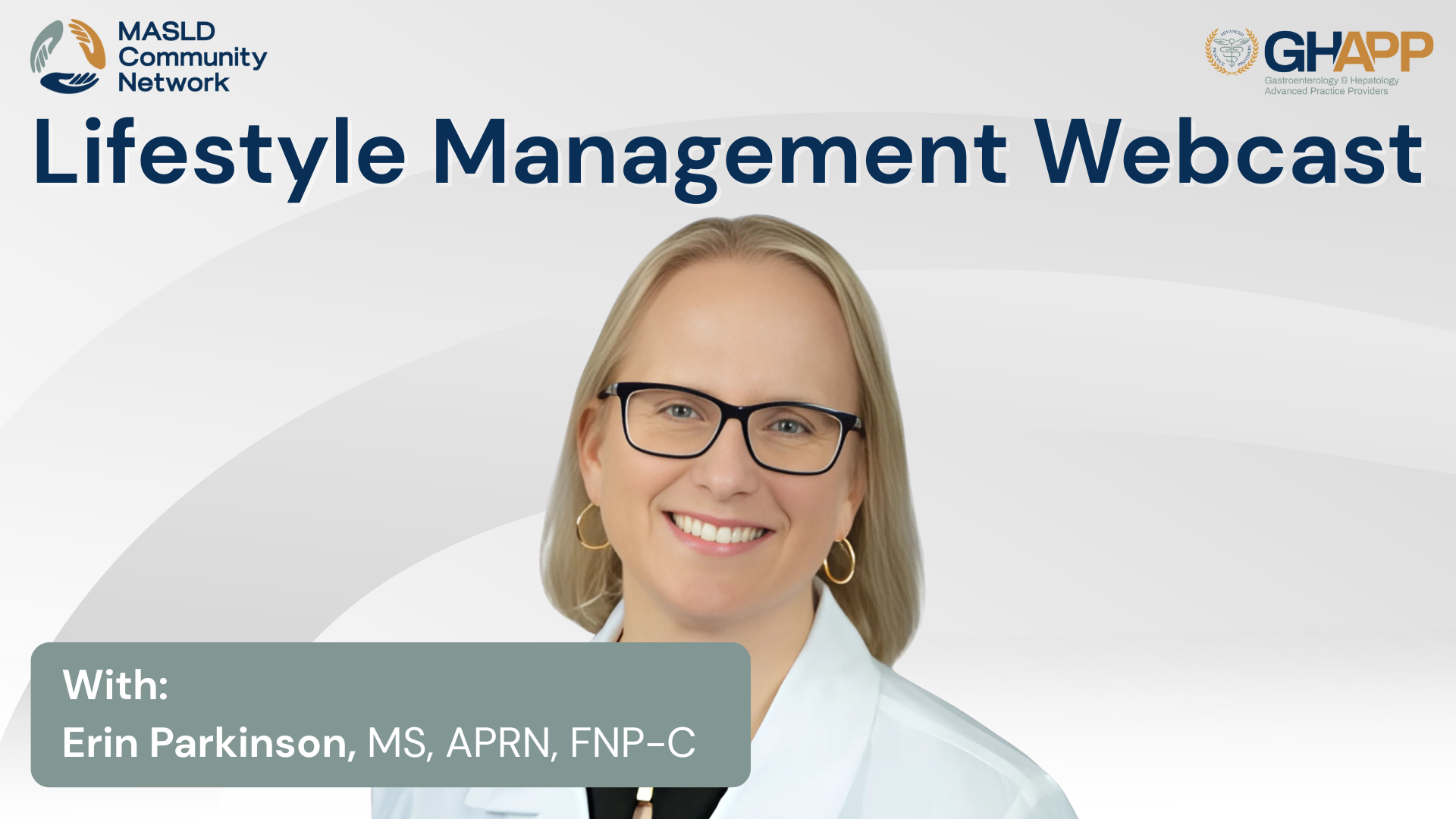
Lifestyle Management With Erin Parkinson

In this impactful session from the GHAPP MASLD Community Network, Erin Parkinson, NP, explores the vital role of lifestyle modifications in the management of MASLD (Metabolic dysfunction-associated steatotic liver disease) and MASH (Metabolic dysfunction-associated steatohepatitis). Through the lens of a real-world case study, Erin illustrates how clinical tools like FIB-4 and FibroScan® can be used to assess fibrosis risk and guide interventions for patients presenting with metabolic syndrome and hepatic steatosis. With a focus on practical, personalized care, this presentation highlights how diet, exercise, and culturally sensitive counseling can meaningfully reduce hepatic fat, inflammation, and fibrosis—key factors in preventing progression to cirrhosis or hepatocellular carcinoma. Erin discusses the impact of processed foods, high-fructose corn syrup, and sedentary behavior, while offering actionable guidance on introducing Mediterranean diets, intermittent fasting, and realistic exercise goals tailored to individual readiness and barriers. Whether you're a hepatology specialist, primary care provider, or obesity medicine clinician, this talk delivers tools to better support patients with MASLD/MASH through sustainable behavioral change and longitudinal follow-up.
Watch Now

APP Insight: Common Questions from Community GI About MASH

In this informative video, Janet Gripshover, DNP, FNP-BC, and nurse manager for the liver transplant program at Cedars-Sinai, answers key questions about managing MASH (Metabolic Dysfunction–Associated Steatohepatitis) and navigating non-invasive testing. She addresses a common clinical challenge—what to do when FIB-4 and FibroScan results are discordant. Janet explains that while non-invasive tests are useful, they're not foolproof, and when results are unclear—especially in patients with significant metabolic risk factors—liver biopsy remains the gold standard for accurate diagnosis. She also shares expert recommendations on dietary changes for patients with fatty liver disease, emphasizing alcohol avoidance, high-protein, low-fat, and lower-carb diets, as well as achievable weight loss goals (around 5% of body weight). Janet highlights when to escalate care beyond lifestyle interventions—typically after 3 to 6 months if there’s no improvement—and discusses options such as pharmacologic therapy or bariatric surgery. This video provides practical, evidence-based guidance for healthcare providers managing the complexities of MASLD and MASH.
Watch Now





 September 2025
September 2025 